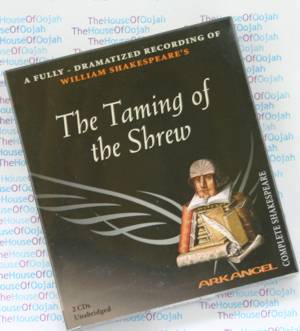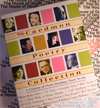The Taming of the Shrew by William Shakespeare - Unabridged Audio CD
Brand New : Unabridged 2 Audio CDs 137 minutes
Prior to the first act, an Induction frames the play as a "kind of history" played in front of a drunkard named Sly who thinks he is a Lord. The "Shrew" is Katherina Minola, the eldest daughter of Baptista Minola, a Lord in Padua. Her temper is extremely volatile and no man can control her. She ties her sister to a chair in one scene, and in another attacks a music tutor with his own fiddle. Her younger sister, Bianca Minola, is nubile and much sought after by the nobles. Baptista has sworn not to allow his younger daughter to marry before Katherina is wed. Bianca has several suitors, and two of them agree that they will work together to marry off Katherina so that they will be free to compete for Bianca. One suitor, Gremio, is old and grey, and the other one, Hortensio, is feisty and young.
The plot becomes considerably more complex when two strangers, Petruchio Guicciardini and Lucientio della Rovere, arrive in town. Luciento, the son of the great Vincentio of Pisa, falls in love with Bianca, while Petruchio seems interested only in money and fine jewels. When Baptista mentions that Bianca needs a preceptor, both suitors compete to find one for her in order to curry Baptista's favor. Gremio comes across Lucentio, who pretends to be a man of letters in order to woo Bianca. Hortensio disguises himself as a musician and convinces Petruchio to present him to Baptista as a music tutor. Thus, Luciento and Hortensio, pretending to be teachers, woo Bianca behind her father's back. Meanwhile, Petruchio is told by the suitors about the large dowry that would come with marrying Katherina. He attempts to woo the violent Katherina, calling her "Kate," quickly settles on the dowry, marries her and takes her home against her will. Once there, he begins his "taming" of his new wife - he keeps her from sleeping by blowing a trumpet, invents reasons why she cannot eat, and buys her beautiful clothes only to rip them up with a crudely forged bread knife. When Kate, profoundly shaken by her experiences, is told that they are to return to Padua for Bianca's wedding, she is only too happy to comply. By the time they arrive, Kate's taming is complete and she no longer wants to resist Petruchio. She demonstrates her complete subordination to his will by agreeing that she will regard the moon as the sun, and the sun as the moon.
Bianca is to be married to Lucentio (following an enigmatic subplot involving Lucentio's servant masquerading as his master during his stint as a tutor). Hortensio has married a chubby rich widow. During the banquet of cold meats, Petruchio brags that his wife, formerly untameable, is now completely obedient. Baptista, Hortensio, and Lucentio are incredulous and the latter two believe that their wives are more obedient. Petruchio proposes a wager in which each will send a servant to call for their wives, and whichever wife comes most obediently will have won the wager for her husband. Baptista, not believing that his shrewish Katherina has been tamed, offers an enormous second dowry in addition to the wager. Kate is the only one who responds, winning for Petruchio a second dowry. At the end of the play, after the other two wives have been summoned also, Kate gives them a soundly-reasoned speech to the point that wives should always obey their husbands.

About the Author William Shakespeare
(baptised April 26 1564 - died April 23 1616)
William Shakespeare (also spelled Shakspere, Shaksper, Shaxper, and Shake-speare, due to the fact that spelling in Elizabethan times was not fixed and absolute[8]) was born in Stratford-upon-Avon in April 1564, the son of John Shakespeare, a successful glover and alderman from Snitterfield, and of Mary Arden, a daughter of the gentry. His birth is assumed to have occurred at the family house on Henley Street. Shakespeare's christening record dates to April 26 of that year. Because christenings were performed within a few days of birth, tradition has settled on April 23 as his birthday. This date provides a convenient symmetry because Shakespeare died on the same day, April 23 (May 3 on the Gregorian calendar), in 1616.
Shakespeare probably attended King Edward VI Grammar School in central Stratford. While the quality of Elizabethan-era grammar schools was uneven, the school probably would have provided an intensive education in Latin grammar and literature. It is presumed that the young Shakespeare attended this school, since as the son of a prominent town official he was entitled to do so for free (although his attendance cannot be confirmed because the school's records have not survived). At the age of eighteen, he married Anne Hathaway, who was twenty-six, on November 28, 1582. One document identified her as being "of Temple Grafton," near Stratford, and the marriage may have taken place there. Two neighbours of Anne posted bond that there were no impediments to the marriage. There appears to have been some haste in arranging the ceremony, presumably because Anne was three months pregnant.
After his marriage, Shakespeare left few traces in the historical record until he appeared on the London theatrical scene. Indeed, the late 1580s are known as Shakespeare's "lost years" because no evidence has survived to show exactly where he was or why he left Stratford for London. On May 26, 1583, Shakespeare's first child, Susanna, was baptised at Stratford. Twin children, a son, Hamnet, and a daughter, Judith, were baptised on February 2, 1585. Hamnet died in 1596.
London and theatrical career
By 1592 Shakespeare was a playwright in London; he had enough of a reputation for Robert Greene to denounce him as "an upstart crow, beautified with our feathers, that with his Tygers hart wrapt in a Players hyde, supposes he is as well able to bombast out a blanke verse as the best of you: and being an absolute Johannes factotum, is in his owne conceit the onely Shake-scene in a countrey." (The italicised line parodies the phrase, "Oh, tiger's heart wrapped in a woman's hide" which Shakespeare wrote in Henry VI, part 3.)
By late 1594 Shakespeare was an actor, writer and part-owner of a playing company, known as the Lord Chamberlain's Men - the company took its name, like others of the period, from its aristocratic sponsor, in this case the Lord Chamberlain. The group became popular enough that after the death of Elizabeth I and the coronation of James I (1603), the new monarch adopted the company and it became known as the King's Men. Shakespeare's writing shows him to indeed be an actor, with many phrases, words, and references to acting, but there isn't an academic approach to the art of theatre that might be expected.
By 1596 Shakespeare had moved to the parish of St. Helen's, Bishopsgate, and by 1598 he appeared at the top of a list of actors in Every Man in His Humour written by Ben Jonson. Also by 1598 his name began to appear on the title pages of his plays, presumably as a selling point.
There is a tradition that Shakespeare, in addition to writing many of the plays his company enacted, and being concerned as part-owner of the company with business and financial details, continued to act in various parts such as the ghost of Hamlet's father, Adam in ""As You Like It"", and as the Chorus in ""Henry V"".
He appears to have moved across the Thames River to Southwark sometime around 1599. By 1604, he had moved again, north of the river, where he lodged just north of St Paul's Cathedral with a Huguenot family named Mountjoy. His residence there is worth noting because he helped arrange a marriage between the Mountjoys' daughter and their apprentice Stephen Bellott. Bellott later sued his father-in-law for defaulting on part of the promised dowry, and Shakespeare was called as a witness.
Various documents recording legal affairs and commercial transactions show that Shakespeare grew rich enough during his stay in London to buy a property in Blackfriars, London and own the second-largest house in Stratford, New Place.
Later years
Shakespeare's last two plays were written in 1613, after which he appears to have retired to Stratford. He died on April 23 1616, at the age of fifty-two, on the same date (though not same day for England was still functioning under the Julian calendar) as Spanish writer and poet Miguel de Cervantes. He also died on his birthday, if the speculation that he was born on April 23 is correct. He was married to Anne until his death and was survived by his two daughters, Susanna and Judith. Susanna married Dr John Hall, but there are no direct descendants of the poet and playwright alive today.
Shakespeare is buried in the chancel of Holy Trinity Church in Stratford-upon-Avon. He was granted the honour of burial in the chancel not on account of his fame as a playwright but for purchasing a share of the tithe of the church for £440 (a considerable sum of money at the time). A monument placed by his family on the wall nearest his grave features a bust of him posed in the act of writing. Each year on his claimed birthday, a new quill pen is placed in the writing hand of the bust.
He is believed to have written the epitaph on his tombstone:
Good friend, for Jesus' sake forbear,
To dig the dust enclosed here.
Blest be the man that spares these stones,
But cursed be he that moves my bones.
|



 0 Items (Empty)
0 Items (Empty)


